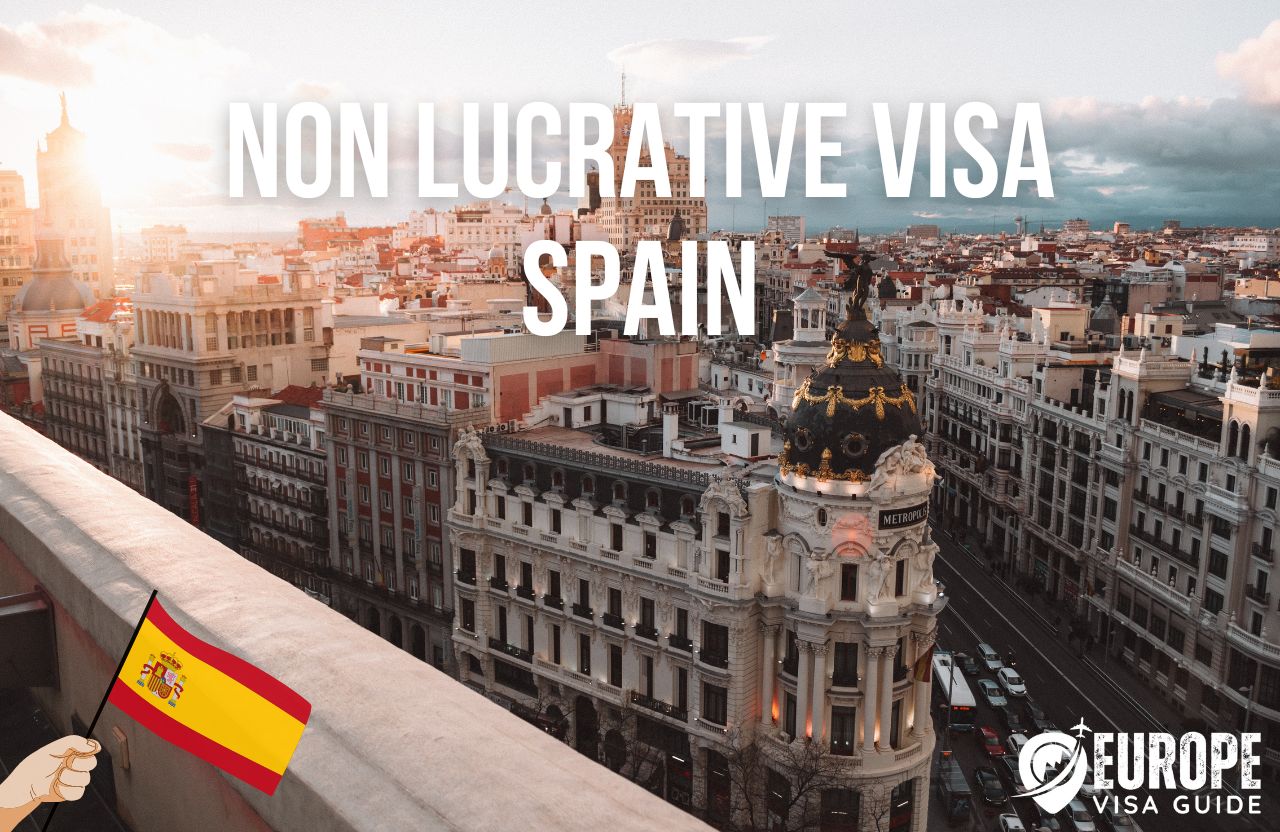
Table of Contents
Are you dreaming of moving to Spain in 2024 but don’t have a job lined up? Don’t worry! You can still make your dream a reality with the Non Lucrative Visa Spain (NLV). In this comprehensive guide, we will explore everything you need to know about this visa, including the different types of eligible income, health insurance requirements, documentation needed, and the application process. We’ll also discuss the benefits, drawbacks, and potential pathway to Spanish citizenship through the NLV.
1. What is the Non Lucrative Visa?
The Non Lucrative Visa is specially designed for non-EU/EEA and non-Swiss individuals who wish to live in Spain on a full-time basis without engaging in any economic or professional activities. Unlike the Spain Golden Visa, which requires a significant investment, the NLV is based on proof of sufficient economic means from sources outside of Spain. This visa serves as a pathway to Spanish permanent residency and eventual citizenship, granting you the right to live, work, study, and retire anywhere in the EU, EEA, or Switzerland.
Spain offers a range of financial incentives to attract new residents, with several towns even offering financial rewards for relocating. The NLV is an excellent option for retirees, as it allows you to enjoy a sunny and relaxed retirement using your pension income. Additionally, you can bring your family to Spain and provide them with the same benefits. Let’s explore the advantages of the Non Lucrative Visa in more detail.
2. Benefits of the Non Lucrative Visa
The Non Lucrative Visa offers several benefits for individuals looking to relocate to Spain:
- Easy Approval: Meeting the requirements makes the NLV relatively easy to obtain compared to other visa options.
- No Large Investment Required: Unlike the Spain Golden Visa, which demands a substantial investment, the NLV does not require any significant financial commitment.
- Travel Freedom: With the NLV, you can travel within the Schengen zone as a tourist for up to 90 days at a time without the need for an additional visa.
- Retirement Opportunity: The NLV is perfect for retirees, as it allows you to enjoy your retirement in Spain using your pension income.
- Access to Education, Investment, and Property: With the NLV, you can study at schools or universities, invest in Spain, and buy property in the country.
- Family Inclusion: You can bring your family members with you to Spain and provide them with the same benefits and opportunities.
- Pathway to Spanish Permanent Residency and Citizenship: The NLV serves as the first step towards Spanish permanent residency, which can be obtained after five years. After ten years, you become eligible to apply for Spanish citizenship.
These benefits make the Non Lucrative Visa an attractive option for individuals seeking to make Spain their new home. Now, let’s explore what it means for the visa to be “non lucrative.”
3. Understanding “Non Lucrative”
The term “non lucrative” refers to the fact that NLV holders, along with their family members, are prohibited from engaging in any economic or professional activities in Spain. The intention behind this requirement is to ensure that visa holders can support themselves and their families using funds from sources outside of Spain.
The Spanish government allows various types of income to meet the non lucrative visa’s financial requirements. These include pension income, income from annuities or endowments, dividends from investments, rental income from property located outside of Spain, interest earned on savings located outside of Spain, income from royalties, income from trust funds, and substantial savings that cover at least one year of living expenses in Spain.
The objective is to demonstrate that you can live in Spain without burdening the Spanish state or competing for local job opportunities. The Non Lucrative Visa is similar to other passive income residency visas available in the European Union, such as the popular Portugal D7 visa. Now, let’s address the question of whether remote work is allowed under the NLV.
4. Working Remotely with an NLV in Spain
While the Non Lucrative Visa Spain does not explicitly include income from remote work as an eligible source of income, the issue remains somewhat ambiguous. Many people inquire about the possibility of working remotely for a foreign company while holding the NLV. However, there is conflicting information on this topic, and Spanish embassies are becoming increasingly strict in their interpretation of the rules.
Based on our research and discussions with Spanish lawyers, it is advisable to avoid relying on remote work income for your NLV application. Spanish embassies worldwide are more likely to reject applications that include remote work income, particularly as the number of visa applicants increases. To ensure a successful application, it is best not to mention remote work as your basis for the NLV.
Please consult a Spanish immigration lawyer to discuss your specific situation before proceeding with your application. Now that we have explored the working conditions under the NLV, let’s summarize the key points of the visa.
5. Non Lucrative Visa Spain: In Brief
To provide you with a quick overview of the Non Lucrative Visa Spain, we have summarized the essential details in the table below:
|
Aspect |
Non Lucrative Visa Spain |
|---|---|
|
Working in Spain? |
No |
|
Studying at a Spanish school or university? |
Yes |
|
Buying property in Spain? |
Yes |
|
Investing in Spain? |
Yes |
|
Paying taxes in Spain? |
Yes |
|
Timeline to permanent residency |
5 years |
|
Timeline to Spanish citizenship |
10 years |
|
Physical stay requirements |
183 days per year |
|
Minimum passive income (annual, one person) |
€27,792 |
This summary provides a quick reference for the key features of the Non Lucrative Visa. Now, let’s delve into the specific requirements for obtaining the NLV.
6. Non Lucrative Visa Spain Requirements
To apply for the non lucrative visa for Spain, you must meet several requirements. Let’s take a closer look at the basic prerequisites:
- Sufficient Passive Income: You must demonstrate that you have enough passive income to support yourself and your family while in Spain. This income should originate from sources outside of Spain, such as pension income, annuities, dividends, rental income, interest, royalties, or substantial savings.
- Medical Insurance Coverage: You must have a suitable medical insurance policy that ensures you will not become a burden on the Spanish healthcare system.
- Clean Criminal Record: You must provide proof of having no criminal record within the last five years.
- Good Health: You and your family members must demonstrate that you are in good health.
The Non Lucrative Visa Spain is available to individuals who are not citizens of any EU/EEA country or Switzerland. You can include your family members, such as your spouse, civil partner, and dependent children, in your application. Keep in mind that each family member included in the application will require additional income to support them. Now, let’s discuss the specific financial requirements for the NLV.
Passive Income Requirements for the NLV
The Spanish government determines the income requirements for the Non Lucrative Visa based on the IPREM (Public Multiple Effects Income Indicator). To meet the income requirements, you must have 400% of the IPREM as a lump sum in your bank account. This amounts to €579.02 per month, according to the latest figures.
To provide a clear understanding of the income thresholds, we have compiled a table:
|
Number of Applicants |
Minimum Annual Income (€) |
|---|---|
|
Main applicant only |
€27,792 |
|
Main applicant and one dependent |
€34,731 |
|
Main applicant and two dependents |
€41,689 |
|
Main applicant and three dependents |
€48,638 |
It is worth noting that applying with income just above the minimum threshold may pose challenges in some embassies. To increase your chances of approval, we recommend exceeding the minimum threshold by at least €500 per dependent. Now that we have covered the requirements, let’s move on to the application process.
7. How to Apply for a Non Lucrative Visa in Spain
The application process for the spain non lucrative visa occurs in two stages: the initial application at the Spanish embassy or consulate in your country of citizenship or permanent residence, and the completion of the second stage with the immigration authorities after you arrive in Spain.
Stage 1: Getting Your Visa at the Spanish Embassy
During the first stage, you must submit your application at the Spanish embassy or consulate. The required documents may vary slightly depending on the specific embassy, but the following items are generally needed:
- Completed national visa application form (two copies)
- Form EX-01
- Authorization Form M790 Codigo 052
- Three passport-sized photos
- Original passport (valid for at least one year)
- Certified copies of each page of your passport
- Proof of income (e.g., bank statements)
- Police criminal record
- Medical certificate
- Proof of international medical insurance policy
- Marriage certificate (if applicable and dependent spouse is included)
- Birth certificates (for dependent children)
All documents must be translated into Spanish by a government-approved translator and legalized with the Apostille of the Hague Convention. Additionally, there is a non-refundable processing fee for the NLV Spain application, which varies according to your citizenship. Most countries require a fee of €80, while US citizens must pay €123 and Canadians must pay €507.
The processing time for NLV applications varies by embassy but can take up to three months. Once approved, you will receive the visa affixed to a page of your passport. This visa allows you to enter Spain and be exempt from the regular 90-day tourist stay. It is essential to enter Spain within three months to proceed to the second stage.
Stage 2: Obtaining Your Residence Card in Spain
After arriving in Spain, you must complete the second stage of the NLV process within one month. This involves applying for your residence card at the nearest Foreigners Office. You will need to present your passport, visa, three passport-sized photos, and proof of payment for the residence card fee. Upon approval, you will be issued a Foreigners Identity Card, known as a TIE (Tarjeta de Identidad de Extranjero).
8. Renewing Your NLV and Changing Residency Status
The spanish non-lucrative visa is initially valid for one year. To continue your residency, you must renew it every two years for a total of three renewals. Each renewal requires proof of sufficient funds, suitable medical insurance, and a valid passport. The financial requirements for renewal are double the original amount, as you are applying for two years of residency.
After five years of temporary residency, you become eligible to apply for Spanish permanent residency. Once you obtain permanent residency, you are no longer required to prove any income requirements. Additionally, after the first year of the NLV, you have the option to switch to a different residence status if desired, such as a work permit or business visa.
9. Non Lucrative Visa and Tax Obligations in Spain
Holders of the Non Lucrative Visa Spain must spend a minimum of 183 days per year physically present in Spain. This typically triggers tax residency obligations, meaning you will be required to pay taxes in Spain on your worldwide income. However, Spain has double taxation treaties with many countries, which prevent you from being taxed twice on the same income.
We strongly recommend consulting a qualified tax advisor to understand your specific tax obligations and any benefits provided by double taxation agreements between Spain and your home country.
10. Non Lucrative Visa Spain vs Golden Visa Spain
The non lucrative Spanish visa is often compared to the Golden Visa Spain, as both are popular options for obtaining residency in the country. However, there are significant differences between the two visas. Let’s compare them:
|
Aspect |
Spain Golden Visa |
Non Lucrative Visa Spain |
|---|---|---|
|
Financial Requirements |
Minimum €500,000 investment |
Minimum annual income of €27,792 (one person) |
|
Physical Stay Requirements |
None (one visit per year) |
183 days per year |
|
Ability to Work in Spain |
Yes |
No |
|
Tax Residency Requirement |
No |
Yes |
|
Application Location |
Spain |
Spanish embassy/consulate in home country |
|
Remote Work Allowed |
No |
No |
The Golden Visa Spain requires a substantial investment, typically €500,000 in Spanish real estate, to obtain residency. This visa allows you to work in Spain, has no physical stay requirements, and does not require you to apply from your home country. On the other hand, the Non Lucrative Visa does not require a large investment but has strict physical stay requirements and prohibits any economic or professional activities in Spain.
The choice between the two visas depends on your specific circumstances and goals. If you plan to work in Spain or prefer a visa with more flexibility, the Golden Visa may be more suitable. However, if you are seeking a retirement option or prefer a visa with a lower financial commitment, the Non Lucrative Visa is an excellent choice. Now, let’s compare the Non Lucrative Visa Spain to the Portugal D7 Visa.
11. Non Lucrative Visa Spain vs Portugal D7 Visa
Portugal and Spain both offer passive income residency visas, making them attractive options for individuals seeking to relocate. Let’s compare the Non-Lucrative Visa Spain to the Portugal D7 Visa:
|
Aspect |
Non Lucrative Visa Spain |
Portugal D7 Visa |
|---|---|---|
|
Minimum Annual Income (1 person) |
€27,792 |
€8,460 |
|
Physical Stay Requirements |
183 days |
183 days |
|
Tax Residency Requirement |
Yes |
Yes |
|
Application Location |
Spanish embassy/consulate in home country |
Portuguese embassy/consulate in home country |
|
Remote Work Allowed |
No |
Yes |
|
Family Inclusion |
Yes |
Yes |
|
Pathway to Permanent Residency |
Yes |
Yes |
|
Pathway to Citizenship |
Yes |
Yes |
The most significant difference between the two visas is the minimum annual income requirement. The Non Lucrative Visa Spain has a higher income threshold, making it less accessible for individuals with lower incomes. In contrast, the Portugal D7 Visa has a lower income requirement, allowing a wider range of individuals, including retirees, investors, and digital nomads, to qualify.
Another difference is the acceptance of remote work income. While the Portugal D7 Visa allows applicants to include income from remote work, the Non Lucrative Visa Spain generally does not. Additionally, Portugal offers the Non-Habitual Residency (NHR) program, which provides tax advantages for certain types of foreign-sourced income.
Consider your financial situation, lifestyle preferences, and goals when deciding between the Spain Non-Lucrative Visa and the Portugal D7 Visa. Now, let’s address some frequently asked questions about the NLV.
12. Frequently Asked Questions (FAQs)
Q: How much money do I need for a Non Lucrative Visa in Spain?
A: To qualify for the Non Lucrative Visa Spain, you need at least €27,792 per year for a single applicant. If you plan to bring dependent family members, you must show proof of additional income to support them.
Q: Is Spain currently accepting Non Lucrative Visa applications?
A: Yes, Spain is currently accepting new applications for the Non Lucrative Visa (as of May 2022).
Q: How many times can I renew the Non Lucrative Visa Spain?
A: The Non-Lucrative Visa Spain can be renewed up to three times. The initial residency is valid for one year, followed by two additional two-year renewals. After five years of temporary residency, you become eligible to apply for Spanish permanent residency.
Q: Can I work remotely on a Non Lucrative Visa in Spain?
A: No, income from remote work is generally not accepted for the Non Lucrative Visa Spain. Many Spanish embassies are rejecting applications based on remote work income.
Q: How can I stay in Spain for a year?
A: You can stay in Spain for a year by applying for a residency visa, such as the Non Lucrative Visa Spain or the Spain Golden Visa.
Q: Can I obtain residency in Spain by buying a house?
A: Yes, you can obtain residency in Spain through the Golden Visa program by purchasing a property valued at a minimum of €500,000.
Q: How do I renew my Spanish Non Lucrative Visa?
A: To renew your Spanish Non Lucrative Visa, you must provide proof of sufficient funds, suitable medical insurance, and a valid passport. The required funds for renewal are double the original amount, as you are applying for two years of residency.
Q: How can I stay in Spain for longer than 90 days?
A: To stay in Spain for longer than 90 days, you must apply for a residency visa, such as the Non Lucrative Visa or the Golden Visa.
Q: Will I be able to work in Spain after Brexit?
A: Yes, you can work in Spain after Brexit by applying for one of Spain’s work permits. The Spain Golden Visa is also an option for working in the country.
Q: Does Spain have a retirement visa?
A: While Spain does not have a specific retirement visa, the Non Lucrative Visa is a suitable option for retirees. Pension income is considered passive income and can be used to meet the financial requirements of the visa.
Q: How much money do I need to live in Spain after Brexit?
A: To live in Spain after Brexit, you need either €500,000 for the Golden Visa or €27,792 per year (for a single applicant) for the Non Lucrative Visa. If you plan to bring dependent family members, you must show proof of additional income to support them.
Q: Do I need to pay taxes in Spain on a Non Lucrative Visa?
A: Yes, as a resident on the Non Lucrative Visa Spain, you are required to pay taxes on your worldwide income. Spending at least 183 days per year physically present in Spain triggers tax residency obligations.
Q: Will I receive a refund if my Non Lucrative Visa application is denied?
A: No, application fees for the Non Lucrative Visa are non-refundable.
Q: Is the Non Lucrative Visa Spain a good option for retirees?
A: Yes, the Non Lucrative Visa Spain is an excellent choice for retirees. Pension income is considered passive income and can be used to meet the visa’s financial requirements, allowing retirees to live comfortably in Spain.
Q: How long is the Non Lucrative Visa Spain valid for?
A: The Non Lucrative Visa Spain authorizes you to be a resident in Spain for one year. You must enter Spain within three months of receiving the visa to obtain your residence permit. After one year, you will need to renew your residence permit.
Q: Can I apply for Spanish permanent residency after living in Spain on a Non Lucrative Visa?
A: Yes, you can apply for Spanish permanent residency after living in Spain for five years with the Non Lucrative Visa.
Q: Can I apply for Spanish citizenship after living in Spain on a Non Lucrative Visa?
A: Yes, you can apply for Spanish citizenship after living in Spain for ten years with the Non Lucrative Visa. Citizens of certain Latin American countries, Andorra, Equatorial Guinea, the Philippines, or Portugal can apply for citizenship after two years of residency in Spain.
This concludes our comprehensive guide to the Non Lucrative Visa Spain. We have covered the application process, requirements, benefits, and comparisons to other visa options. If you are considering relocating to Spain, the NLV can be an excellent choice for starting your journey towards Spanish residency and potential citizenship. Remember to consult with immigration experts and tax advisors to ensure a smooth application process. Good luck with your plans to move to Spain!





